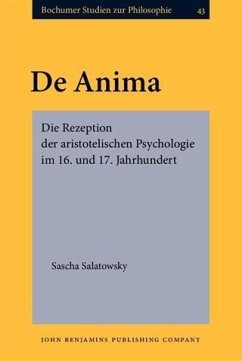Aristoteles' De Anima ist einer der zentralen Texte der Philosophiegeschichte. Seine grundlegende Leistung liegt in der alle Lebewesen umfassenden ontologisch-ontischen Bestimmung der Seele und ihrer Vermogen, einschlielich der Lehre vom Geist (nous), deren nahere Explikation seit der Antike Anla zu vielfaltigen Diskussionen gab. Die vorliegende Studie ermittelt unter Ruckgriff auf die traditionellen Schulen des Alexandrismus, Neuplatonismus, Averroismus und Thomismus diejenigen mannigfaltigen philosophischen und theologischen Konstellationen des 16. und 17. Jh.s, die von innerkatholischen wie interkonfessionellen Auseinandersetzungen zwischen Katholiken, Lutheranern und Calvinisten gepragt waren. Unter diesem Gesichtspunkt werden die entsprechenden Werke der Reformatoren Luther und Melanchthon, der Renaissance-Aristoteliker Portio, Toletus, Zabarella und die Conimbrincenser sowie die hier erstmals berucksichtigten Schriften der lutherischen und calvinistischen Schulphilosophen des 17. Jh.s. interpretiert.Aristotle's On the soul is one of the most important books in the history of philosophy. Its fundamental achievement is based on the ontological-ontical definition of the soul and its virtues, which embrace all living beings, including the doctrine of the mind (nous), and whose further explication has been interpreted controversially since antiquity. With respect to the traditional schools of Alexandrism, Neoplatonism, Averroism and Thomism the present study studies the various philosophical and theological constellations of the 16th and 17th century, which were determined by the intracatholical as well as by the interdenominational controversies between the Catholics, Lutherans and Calvinists. From this point of view the works of Luther and Melanchthon, of the Renaissance-Aristotelians Portio, Toletus, Zabarella, and the Conimbricenses as well as the works of the Lutheran and Calvinistic Philosophers of the 17th century are interpreted, these last ones being taken into consideration here for the first time. Then follow interpretations of some of the main philosophical concepts of Aristotle's De Anima in the 16th and 17th century, namely the Protestant Aristotelianism of Luther (1483-1546) and Melanchthon (1497-1560), the 'Second Scholastic' of the Jesuits Toletus (1532-1596) and Emmanul de Goes, the Natural Philosophy of Portio (1496-1554) and Zabarella (1533-1589) and at least the New Protestant Aristotelianism of Martini (1570-1649), Evenius (1585/9-1639), Scheibler (1589-1653), Leuschner (1589-1641) and Dannhauer (1603-1666) at the Lutheran Universities in Germany in the early 17th century.
Dieser Download kann aus rechtlichen Gründen nur mit Rechnungsadresse in A, B, BG, CY, CZ, D, DK, EW, E, FIN, F, GR, HR, H, IRL, I, LT, L, LR, M, NL, PL, P, R, S, SLO, SK ausgeliefert werden.
Hinweis: Dieser Artikel kann nur an eine deutsche Lieferadresse ausgeliefert werden.


